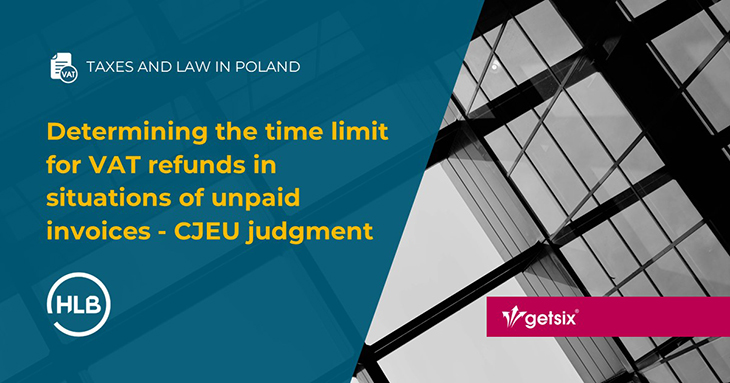Determining the time limit for VAT refunds in situations of unpaid invoices – CJEU judgment
The judgment issued by the Court of Justice of the European Union (CJEU) on February 29, 2024, in case C-314/22, concerns the interpretation of Article 90 of the directive in the context of the admissibility of a delay period related to the settlement of VAT.
Context of the case
Consortium Remi Group AD (CRG), based in Varna, Bulgaria, operated in the construction industry. Between 2006-2010 and 2012, CRG issued invoices to five Bulgarian companies for the supply of goods and services. The invoices included VAT, which was paid for most of the taxable periods. On September 18, 2020, CRG was declared insolvent by the Varnenski Okrazhen sad (Varna District Court), which led to the initiation bankruptcy proceedings.
CRG filed a request to deduct VAT charged on invoices to certain recipients and interest against its public-law liabilities. The tax authorities in Varna refused to deduct the amount of VAT improperly paid and collected, citing the expiration of the statute of limitations and failure to prove the improperly collected amounts. CRG filed a complaint, presenting evidence of the commencement of bankruptcy proceedings against the recipients of the invoices, their bankruptcy, and the acceptance of claims in bankruptcy proceedings. The decision of the tax authority was upheld, and after another unsuccessful complaint before the administrative court, CRG filed a cassation appeal. In the course of examining the merits of the cassation appeal, it was found that resolution of the dispute requires an interpretation of EU law.
Position of the CJEU
The Court of Justice of the European Union interpreted the regulations in the context of the principles of tax neutrality, proportionality, and efficiency, stating that:
- Article 90 of Council Directive 2006/112/EC of November 28, 2006 does not limit the ability of Member States to set deadlines for the submission of VAT refund claims in the event of a reduction in the tax base due to non-payment or partial payment. However, the condition is that this period starts to run from the moment when the taxpayer could – while exercising due diligence – exercise the right to a reduction. If there are no national rules on the procedure, the taxpayer must be able to determine with a reasonable degree of certainty when the exclusion period begins.
- Article 90(1) and Article 273 of Directive 2006/112 mean that in the absence of specific national provisions, these principles do not allow the tax authorities to impose a requirement that a reduction of the VAT taxable base due to an unpaid part or all of an invoice issued by a taxpayer takes place only subject to the prior correction by the original invoice and prior notification to the debtor of the intention to write off the VAT, unless the taxpayer was unable to make such correction in due time and is not at fault.
- Article 90(1) of Directive 2006/112 states that in the event of non-payment or partial payment of an invoice issued by a taxpayer, the taxpayer is entitled to a refund of the paid VAT along with interest on arrears. The lack of detailed rules on the calculation of interest in national legislation means that the date of the taxpayer’s declaration of the right to reduce the tax base in the declaration for the current settlement period is the starting point for calculating this interest.
In summary, Article 90 of Directive 2006/112/EC gives Member States the option to establish an exclusion period for VAT refund claims due to non-payment, which starts from the moment the taxpayer is entitled to a refund. This period must be clear to the taxpayer. In addition, the directive prohibits the tax administration from requiring the correction of invoices as a condition for reducing the VAT base. In the absence of national regulations, the taxpayer may claim interest on late payment from the moment they have exercised their right to reduce VAT.
If you have any questions regarding this topic or if you are in need for any additional information – please do not hesitate to contact us:
CUSTOMER RELATIONSHIPS DEPARTMENT

ELŻBIETA
NARON-GROCHALSKA
Head of
Customer Relationships
Department /
Senior Manager
getsix®
Group
***














